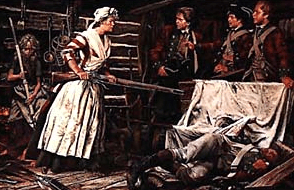Instead of blogging about contemporary women this month, I want to celebrate National Women’s History Month and write about women in our past history. The theme for the National Women’s History Project’s theme for 2014 is: Celebrating Women of Character, Courage, and Commitment. Taking that theme to heart, the Revolutionary War seemed a good place to start.
We all know that Betsy Ross sewed the first American flag to spur on the Patriots and Abigail Adams asked her husband to “remember the ladies” when drafting the documents to form this country (see my blog on Abigail Adams). Most of us are hard-pressed to name any others, but many women supported the Revolutionary War against the British and a surprising number made it into the history books. Several of them were First Women To. . .
There were women of letters who aided the revolution through their writing:
Mercy Otis Warren wrote plays, such as The Blockheads, that lampooned the British. The plays were written anonymously to preserve her head. Later she was the first woman to write a history of the American Revolution.
Phillis Wheatley was the first published black author in America. She wrote poems about patriotism and one about George Washington, to whom she read the poem in person.
There were also women who enlisted as soldiers:
Margaret Corbin was the first woman in U.S. history to receive a pension for her military service. She was originally a camp follower who helped her husband in his cannon-loading responsibilities. When he was mortally wounded, she took his place and was herself wounded. She is buried at the United States Military Academy.
Modern authors Lucy Freeman and Alma Pond called Deborah Sample America’s First Woman Warrior. This is arguable as other women are known to have fought in the American Revolution, but there is no doubt that Deborah Sample was the first—and only—woman to provide her widower with a pension for her services in the Revolutionary War. Deborah Sample enlisted while disguised as a man and when discovered, simply re-enlisted in another unit under another man’s name.
There were many more women, not necessarily firsts, who served the cause. Here is a brief list of a few:
Mary Ludwig Hays – She was also known as “Molly Pitcher,” because she provided water to the soldiers in her husband’s unit. Like Deborah Sample, she took over her husband’s duties when he was wounded.
Catherine Moore Barry – When it seemed General Cornwallis would overrun General Morgan’s troops, Catherine Moore Barry, who knew well the countryside around Cowpens, South Carolina, slipped down short cuts and trails rounding up more Patriots to join—and win—the battle.
Nancy Hart – When forced to cook a meal for British soldiers, Nancy Hart killed two of them with their own muskets. On another occasion she disguised herself as a crazy man and went through the British camp gathering intelligence. A county in Georgia is named for her, as is War Woman Creek.
Hannah Arnett – When some of the Patriots were dispirited with the war’s progress and considered joining the British, Hannah Arnett burst uninvited into their meeting and proclaimed them cowards. She announced that she would abandon her marriage if her husband left the cause. He supported her position, and they prevailed.
Martha Bratton – Her husband provided gunpowder to the Patriots. When he was away and she learned the British were approaching to steal the gunpowder, she rigged the building where it was housed so that it exploded when the British entered. She later set up a hospital and nursed soldiers from both sides.
Lydia Darragh – Because she was a Quaker, the British used her home for a strategic meeting, setting out a plan for a surprise attack on George Washington. Rationalizing that too many would be hurt if she did nothing, she went against her upbringing, and slipped into Washington’s camp to warn him.
Sybil Luddington – When Sybil’s father needed someone to round up the troops as the British headed toward them, Sybil Luddington, like Paul Revere, rode through the neighboring towns sounding the alarm.
Prudence Wright – With several women of Groton, Massachusetts, Prudence Wright, dressed in her husband’s clothes, waylaid a British soldier on a bridge and removed secret messages from his pocket for the local Patriots.
Elizabeth Burgin – While bringing food to soldiers held in prison aboard British ships, Elizabeth Burgin helped plan the escape of 200 prisoners. She was awarded a pension for her service.
Elizabeth Geiger – Carrying a message for the Patriots, Elizabeth Geiger was stopped by British soldiers. Timid about searching her, the soldiers sent for women to do the task. Before the women arrived, she memorized the message, ate it and then delivered its content successfully.
Mary Murray – Although her husband supported the British, Mary Murray sided with the Patriots. When she heard the British would entrap retreating Americans, she invited the British officers to tea and delayed them long enough for American troops to escape.
If you know of other first women during this period, CLICK “Leave a Comment” below and add that information. Thanks!





I would like to know about Hannah foster blair